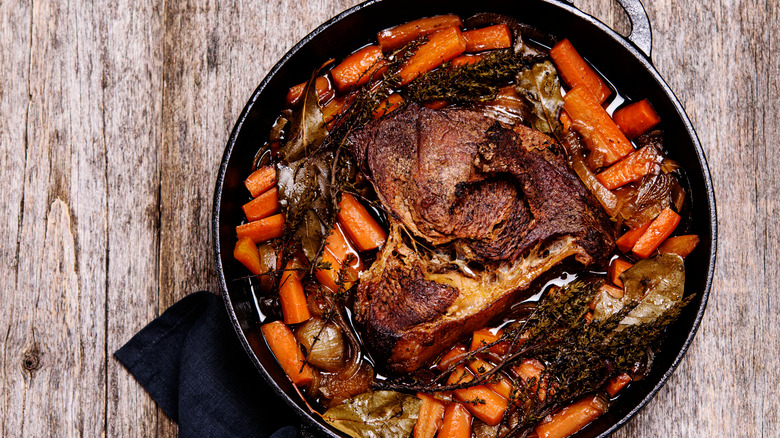The Secret Ingredients In Michael W. Twitty's West African Hanukkah Brisket - Exclusive
In his new book, "Koshersoul: The Faith and Food Journey of an African American Jew," Michael W. Twitty finds new ways to express the intersections of his own heritage, blending the traditional foodways of the global Jewish diaspora with those of the African Atlantic to create a contemporary cuisine rooted in a common emotional memory. Nowhere is this natural fusion of flavors and identities better exemplified than with Twitty's West African take on braised brisket.
In an exclusive interview with Tasting Table, Twitty, who converted to Judaism at 25 years old, described himself as a griot, or storyteller. "The biggest thing for me has been understanding how I come to certain recipes," he said. "There's an active curating of my life, that things should tell a story about me ... It's very important to me."
His West African brisket is a perfect illustration of Twitty himself. "I grew up in a neighborhood [outside Washington, D.C.] that was at the confluence of the Conservative, Reform, and Orthodox congregations," said the James Beard Award-winning author, who has traced his own diverse lineage back to Indigenous Americans, some Irish ancestry, and the African Atlantic slave trade.
During our conversation, he explained how to make his West African-inspired brisket and shared the secret ingredients he's using this year that didn't make it into his published recipes.
How to make Michael W. Twitty's West African brisket
This flavorful take on a traditional braised brisket will surely be a hit with your Hanukkah guests. It's the perfect low-stress party dish because it tastes even better after a night in the fridge, Michael Twitty said.
First, rub the brisket in a West African suya spice — "salt, garlic, onion, Indigenous spices like cardamom, cloves, nutmeg, cinnamon, and other things. There's hot pepper [and] black pepper, which are very spicy and floral and aromatic. It's very pungent and deep."
Then, "like any other brisket," said Twitty, "you sear it." After browning it lightly in a Dutch oven, add "onions, bell peppers, garlic, and ginger and let it do what it's going to do for a couple hours — about four hours as low and slow as you can. Get it as soft as you can, letting those seasonings mix together."
Other ingredients in the stock-based braise, according to a New York Times profile of Twitty, include tomatoes, brown sugar, fresh thyme, and prepared horseradish. If you make the dish ahead, as Twitty recommends, slice it the night before and let all the seasoned braising liquid and flavorful vegetables penetrate the meat. Then, just heat it up in a 350-degree oven for about 30 minutes and serve.
The secret ingredients in Twitty's brisket
"One secret ingredient that I tend to use in my West African brisket that is not in the recipes is country onion," Michael Twitty shared. He'll add country onion to the suya spice rub for an extra kick of flavor.
"Country onion is really not onion," he explained. "It's a byproduct of a tree from West Africa that has more of an onion taste than an onion. It'll hit you in the nose and it's very onion-y, very allium-y, but it's not an allium. It smells super amped up."
The other ingredient Twitty likes to use in his braised brisket is the sweet kosher wine, Manischewitz. "It makes the best secret ingredient in tomato-based briskets," he said. To incorporate Manischewitz, replace some of the braising liquid with it and leave out the brown sugar: "Instead of adding anything else that's sugary or sweet, it really does transform when it's cooking in a pot with other things." It works beautifully to cut some of the acidity in the tomatoes and bring out the savory umami of the browned beef brisket.
For Twitty's full West African-inspired brisket recipe and many others, check out his newest book, "Koshersoul: The Faith and Food Journey of an African American Jew."


